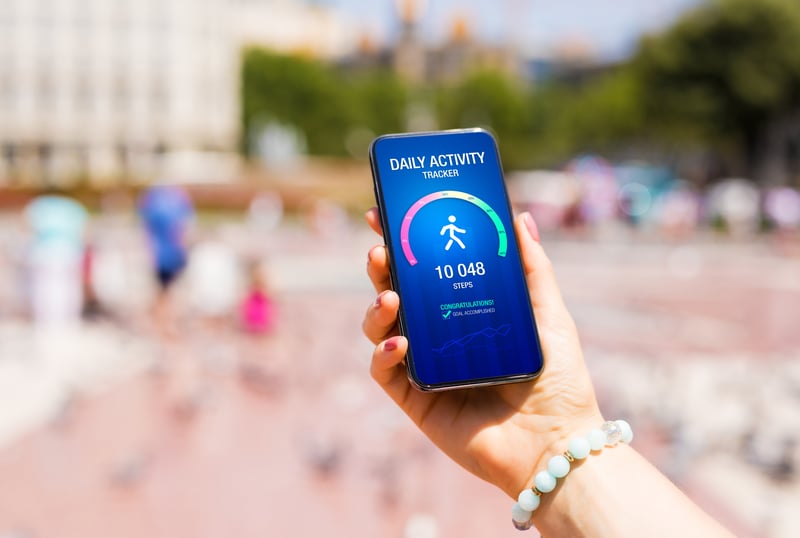Get Healthy!

- Posted March 29, 2023
Missed Getting Your Steps Today? You're Still on Track for Health
For those who want to get active but feel that joining a gym or exercising on a daily basis is a bridge too far, new research may have found the sweet spot: walking.
After stacking the walking habits of 3,100 adults up against a decade's worth of health outcomes, investigators concluded that those who logged roughly 8,000 steps in a single day -- even if only just one day a week -- reduced their risk for premature death.
An 8,000-step jaunt is hardly a quick stroll around the block. It's equivalent to about 4 miles a day. But the study team counted all steps taken -- including while doing chores or shopping for groceries -- not just dedicated walks. And in the end, logging one or two 4-mile days per week lowered the risk for premature death by roughly 15%.
An even greater benefit was seen among those who logged 4-mile walks three days a week. They lowered their risk by nearly 17%, though the benefit appeared to max out at three days per week; no additional protection was seen among those who walked 4 miles on four or more days.
"Our findings should not discourage walking as many days as possible,"said study author Dr. Kosuke Inoue, a physician-scientist in chronic disease epidemiology at Kyoto University in Japan. "The more, the better. But they suggest that for individuals who face difficulties in exercising regularly -- due to work and/or family obligations -- achieving the recommended daily steps only a couple of days per week may have meaningful health benefits."
To assess the protective benefits of walking, Inoue and his colleagues analyzed data that had been collected between 2005 and 2006 by the U.S. National Health and Nutrition Examination Survey.
Participants were all aged 20 and older, with an average age of about 50. About half were white, 1 in 5 were Black and nearly one-quarter were Hispanic.
When surveyed, each participant was outfitted with an accelerometer to monitor the amount of daily steps each took over the course of a week.
About 20% did not end up walking 4 miles on any day during the week. About 17% did so once or twice a week, while more than 60% hit 8,000 steps on three to seven days, the findings showed.
The team then tallied the number of men and women who died during the decade following the survey. About 5% succumbed to heart disease, while about 14% died from any number of other causes.
After cross-referencing the death data with walking habits, the investigators determined that one, two or three days a week of "walking intensively"-- meaning 8,000 steps -- translated into a lower risk for dying early.
The message is that "for individuals who face difficulties in exercising regularly, I would suggest starting walking, even for a couple of days per week, given its potential to reduce mortality risks,"Inoue said.
The report was published online March 28 in JAMA Network Open.
Dr. James Sawalla Guseh, a cardiologist at Massachusetts General Hospital and instructor in medicine at Harvard Medical School in Boston, coauthored an editorial accompanying the study.
He said the study is "putting an exclamation mark on something we already knew: a little bit of exercise goes a long way."
Importantly, Guseh added, "it also highlights how inactivity is a major risk factor for premature death, and should motivate our populations to stay active and move."
Inactivity "atrophies our hearts, muscles and mind and, in so doing, harms our health,"he explained.
By contrast, Guseh said, "evolutionary scientists seem to agree that we evolved to tolerate high amounts of physical activity, especially walking,"which some researchers believe "activate[s] repair mechanisms throughout our bodies that are beneficial."
And going to a gym is not the only way to gain those benefits, given that "gyms were a human creation necessary in part because of our epidemic of inactivity. So, if the gym isn't for you, that's OK,"Guseh said. "Get your steps."
Still, logging enough daily steps to make a real difference "does take some effort,"acknowledged Lona Sandon, program director of the department of clinical nutrition at UT Southwestern Medical Center in Dallas.
"Getting 8,000 steps is not an easy feat for many of us,"she cautioned, noting that "a brisk 30-minute walk at 4 miles per hour for 2 miles may only get you about 4,000 steps, halfway to your goal."
That means that "finding other ways to add movement and walking to your day will be needed," Sandon added. "Housework, gardening, shoveling or walking to the store to pick up a few items is a great way to add more steps. Do anything but sitting. Standup desks are one way people who spend a lot of time doing office work can get some movement without having to think too hard about it."
Her solution: "I keep a mini trampoline in my home office."
More information
There's more on the health benefits of walking at the U.S. Department of Health and Human Services.
SOURCES: Kosuke Inoue, MD, PhD, physician-scientist, chronic disease epidemiology, department of social epidemiology, graduate school of medicine, Kyoto University, Japan; James Sawalla Guseh, MD, cardiologist, cardiovascular performance program, Corrigan Minehan Heart Center, division of cardiology, department of medicine, Massachusetts General Hospital, and instructor in medicine, Harvard Medical School, Boston; Lona Sandon, PhD, RDN, LD, program director and associate professor, department of clinical nutrition, school of health professions, UT Southwestern Medical Center, Dallas; JAMA Network Open, March 28, 2023, online
